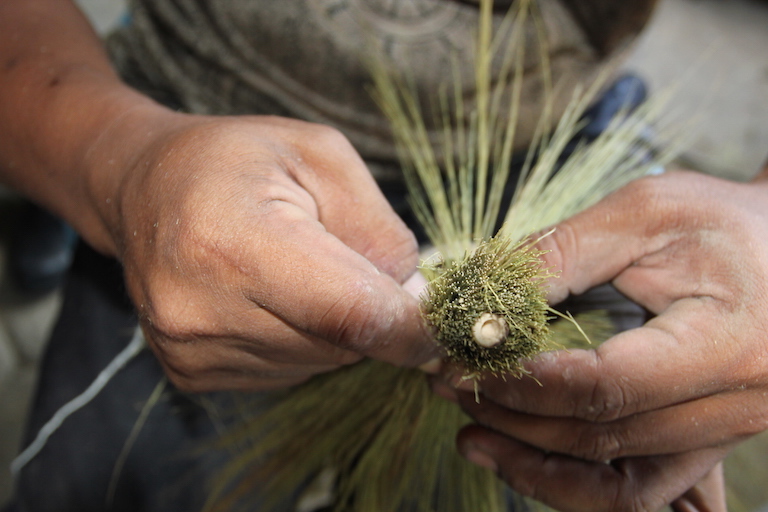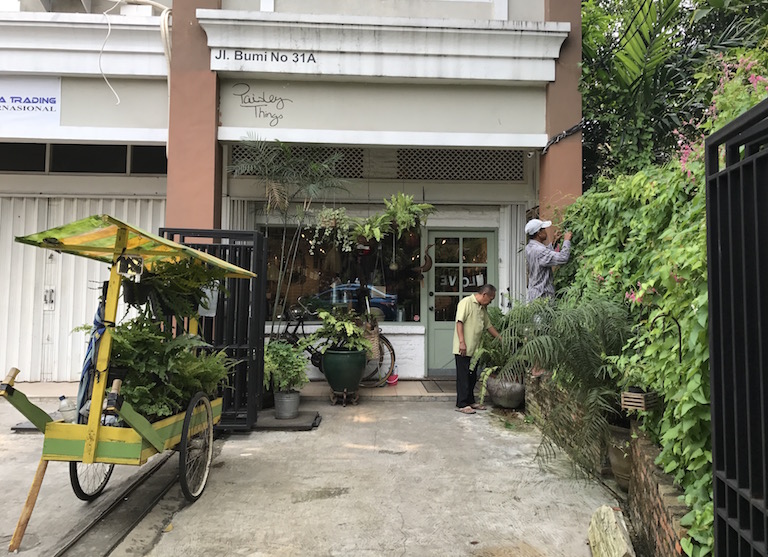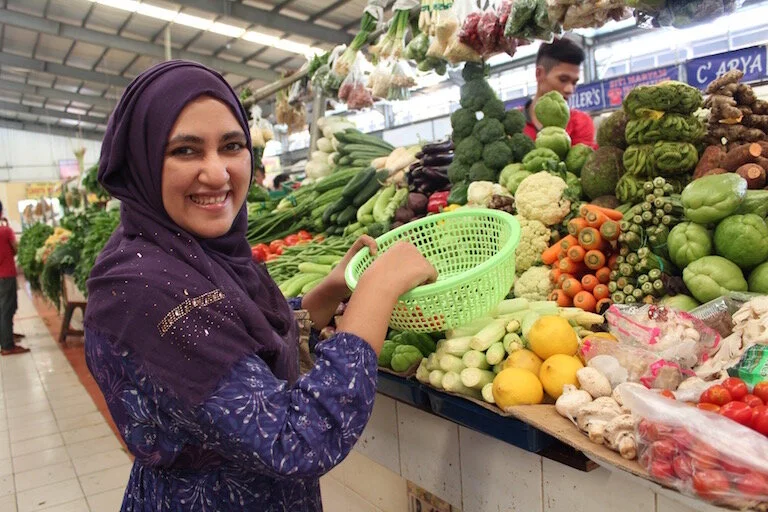Stylish and Ethical Home Decorating with Caroline Tobing of Paisley Things
In today’s interview we chat to Caroline Tobing of Paisley Things about life and her passion for design and beautiful objects. In particular, Caroline shares with us how the enjoyable pursuit of dressing your home can have far-reaching benefits for both the artisans responsible for her designs, and the health of our environment.
We encourage you to take a leaf out of Caroline’s book and give every-day objects that are usually discarded, a new life. We hope today’s post provides you with the inspiration to fulfil this challenge and create a home that is equally beautiful as it is sustainable.
*Kenalkan Caroline Tobing - Founder of Paisley Things and the Darius Tobing Foundation
Caroline stands outside her store, Paisley Things, in Kebayoran Baru (just near Pasar Mayestik)
Tell us a bit about yourself
My story is a convoluted one! Born in France, I arrived in Indonesia as a baby in my mother’s arms. The year was 1965. Sukarno was President and my father had accepted a job working on the Jatiluhur Dam hydroelectricity project located half way between Jakarta and Bandung. Expatriate life is in my blood - my parents were expats as were my grandparents. For the early part of my childhood I was home-schooled by my mother as we were living in the middle of the jungle in Sumatra. However, by the time I reached high school, my mother felt it best that I continue my education in Singapore and we relocated as a family. Here we lived until I moved to the USA for University studies in Interior Design. It was during this time that I met my husband who is of *Batak lineage. After 20 years in the USA we moved to Jakarta. This was 11 years ago.
Do you think that your definition of ‘Home’ has been affected by your life thus far?
‘Home’ to me is wherever my shipping container arrives. Until that point, I feel unrooted. Throughout my whole life, I have collected objects; items that evoke a memory, a feeling and an experience. I have carried these possessions with me and it is this that helps me define ‘home’. Unlike my husband who is able to trace his family back more than 400 years, the possessions that I have accumulated throughout the course of my life help me to define my story.
The shop window at Paisley Things features an eclectic collection of pieces
Tell us about Paisley Things
Paisley Things was established pretty much by accident. In fact, it all started with a broom! I was at an agricultural show, and I noticed a little stall run by a man who was selling hand-made brooms. The weaving detail in the structure caught my eye so I went over to take a closer look.
'It all started with a broom', explained Caroline when asked how Paisley Things began
Talking to the man, it became apparent that he was a skilled artisan who was barely making ends meet. He invited me to his village to see for myself how the brooms were made. I accepted his invitation and drove 4 hours to his *kampung near Cianjur, West Java.
Using a wooden needle the artisan embroidered the brooms and with a single nail, he assembled the finished product. He sold his brooms locally for Rp7000 (about 70 cents). I immediately recognised that he could do much better for himself if he extended his market to Jakarta where a desire for bespoke, handmade products made with heritage skills was growing. I offered him my help and he accepted. I made suggestions regarding small design changes including a longer handle for taller persons. I took this artisan to the French community centre in Cipete, and the whole stock sold out. It wasn’t long after this that other artisans, many from his family, came to me to demonstrate their skills and from this, Paisley Things was born.
The timber needle (green twine attached) that is used for creating the brooms
All of your Artisans continue to live in their kampungs and have not needed to move to Jakarta. Can you explain more about this
As Paisley Things began to grow, I made sure that each artisan who supplied us had their own bank account, allowing us to pay them directly, thus eliminating any middle man. As a result, they never have to wait for the payments of their products or down payments on orders. To keep artisans working they need working capital and this system has made this possible. As a result, the artisans are able to remain in their communities, where they are most happy. The benefits of this are plentiful. The artisans are able to continue living with their family on the land and do not need to come to Jakarta in search of their fortune. By remaining in their homes, they are able to teach their trade to others, keeping these heritage skills alive. Many also tend land, so staying in their communities, they are able to maintain a more subsistence lifestyle, which is true to their way of living. Currently only one of our artisans is from Jakarta. He collects construction steel and recycles it into new products.
This wall decoration has been made from recycled industrial steel
The metal in these wind chimes was collected by street workers carrying large magnets. Walking along, they scan the street for pieces of scrap metal which eventually gets melted down and moulded into these pretty shapes
What are your 3 favourite PT pieces and can you share with us the story behind each
I love them all! I designed all Paisley Things items so I only sell what I love. This means I transfer my passion to my customers.
Made from recycled timber, this duck guards the windowsill in Paisley Things.
In saying this, the engraved glassware is dear to my heart. It is made by a very talented artist from West Java who had little money to begin with. I set him up with the engraving tool and I continue to source the raw materials for him (eg: recycled glass pieces). All he has to pay for is the electricity to run the tool and of course, dedicate the hours to complete the intricate engraving. Each month, he is now able to save money for his future. He has realised his potential.
Engraved recycled carafes
Recycled bottles are supplied to the Glass Engraver who invests hours of work to create delicate and intricate patterns, such as these. The ceramic bird bottle stoppers are also made by hand
Of course the brooms are also nostalgic to me as this is where Paisley Things started.
The broom (background) ultimately served as the catalyst for the establishment of Paisley Things
Can you tell us a little about the Artisans themselves
Paisley Things artisans are both male and female and mostly come from the town of Cianjur, however, we now have artisans extending the length of Java Island. Our artisans are skilled with all matter of materials including: glass, ratan, bamboo, wire, ceramic, recycled steel, galvanised steel, fabric, jute, wood (recycled), and recycled paper. There would be no Paisley Things without these makers. They are beautiful, talented people who have been taught by previous generations.
An artisan for Paisley Things demonstrates the art of weaving (Photo supplied by Paisley Things)
Made from the aerial roots of the Banyan Tree twisted around recycled medicine bottles, this vase is one of the more original designs at Paisley Things
Hand cut cards made from recycled paper and newspaper
Can you give us some advice when selecting pieces to decorate our homes
First and foremost, always buy Indonesian. But you need to go beyond this. You must inquire as to who made the item. Find out the story behind it. Preferably buy direct from the maker or if this is not possible, buy from the person who is working directly with the artisan in order to cut out the middle man. Ensure that the maker is being paid properly and fairly for their work. The notion of Fair Trade should always be at the front of your mind.
What are some improvements you've seen in Jakarta that suggest a greater awareness and appreciation for the hand-made and bespoke
When Paisley Things first started I was afraid. I was concerned that our items would appeal only to the expat community. For a while this was true, but in time this has shifted. Now, a greater majority of our customers are Indonesians. The effect of travel, exposure to Western trends as well as the impact of social media has definitely had a big impact. Of course, the public still needs to be educated on the importance of recycling and up-cycling materials but change is now evident.
Medicine bottles have been given another life. I can just see them hanging from a wall with an assortment of delicate foliage - What would you use them for?
It’s encouraging to see how well our *shibori aprons, table sets, bags and others pieces have been received. They are made from old high-quality bed sheets that have been donated by some of Jakarta’s most exclusive hotels. We then supply the fabric to women whom we trained in the art of shibori and sewing. These women firstly dye the fabric, then cut out the pieces and finally sew them together to create a most beautiful final product.
A shibori apron made from recycled bed sheets
Where do you go for inspiration?
I sleep less and less as inspiration comes to me in the middle of the night. I often have mental pictures of things that I always wanted to buy but could not due to logistics such as moving house and not being able to take excess with me. I even have memories of objects that I saw and appreciated as a child. I recall my mother explaining to me that we could not have them due to our moves. I guess a lot of my inspiration comes from nostalgia.
Caroline is passionate about Paisley Things and how it positively impacts on the quality of life of her artisans
Can you suggest any Websites/Instagram accounts that our Readers should follow
I’m always so busy that I have little time for social media. However, I do recommend the following:
Paisley Things
KuKa Aku Suka
Co Worker Inc
We all collaborate together for the common good. Also, one final recommendation - You must attend the Roof Top Markets of which there are two each year. At these events you are able to meet the makers and learn all about the story behind each object. By following any or all of the above Instagram accounts, you will be notified of when the next Roof Top market will occur.
About the Darius Tobing Foundation
In 2011 the Darius Tobing Foundation was established in Jakarta, Indonesia. Named in honour of Caroline’s late Father-in-law, the Foundation is ultimately all about giving back to the community, in particular to those most vulnerable and in need. In 2012, supported by the Darius Tobing Foundation, Paisley Things was established as a brand and its store in Jl. Bumi in South Jakarta opened.
Web: Darius Tobing Foundation
Email: Darius Tobing Foundation
Paisley Things
Jl. Bumi No. 31A
Kebayoran Baru
Jakarta Selatan 12120
Ph: 021 275 10156
HP: 0813 8001 0410
Email: paisley.things@gmail.com
Instagram: paisley things
Paisley Things on Jl. Bumi, Kebayoran Baru in South Jakarta
*Kenalkan - Let me introduce
*Batak - Batak is a collective term for a number of ethnic groups predominantly in North Sumatra. Today, the Batak are mostly Christian
*Kampung - Village
*Shibori - Japanese manual dyeing technique
Interested in other Home and Design Posts? Here are a few ideas to keep you going..
Rubbish in Jakarta - the mounting problem and the Ffrash solution
ajb’s 5 Easy Steps to Create Your Own Batik Bed Cover
Sustainable Furniture Jakarta - Feature #1 - Ethnicraft
Words: Jo Stevens Photography: a journey bespoke (unless otherwise stated)






















